 There are now six times as many giant sequoia redwoods in Britain as in their native California. Sequoiadendron giganteum specimens were introduced to the U.K. around 160 years ago, and have thrived in Britain’s cool, wet weather, not unlike that of northern California’s forests. A new study found around 500,000 in the country, compared to 80,000 in California itself. The largest British one is a mere 180 feet tall, compared to more than 300 feet for the tallest Californian trees, but sequoia can live for 2,000 years, so there’s “plenty of time for the U.K.’s trees to catch up,” the BBC reported. |